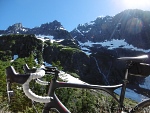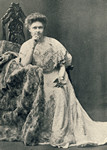| Previous :: Next Topic |
| Author |
Message |
gb
Member


Joined: 01 Jul 2010
Posts: 6310 | TRs | Pics
|
 |
gb
Member
|
 Wed Apr 09, 2014 7:47 pm |
|
|
So, I just bought a digital camera and I would like to take a few Milky Way shots. I would imagine you can't meter Milky Way shots with a modern digital camera - no? I know that with my old film camera and ISO 50 film I could get good star shots at F3.5 to F4 for whatever length of time. So what settings do you use for ISO, aperture and what minimum shutter speed will allow for a Milky Way shot?
|
| Back to top |
  
|
 |
Seventy2002
Member


Joined: 19 Jul 2008
Posts: 512 | TRs | Pics
|
|
| Back to top |
  
|
 |
DaveMorrowPhoto
Member


Joined: 10 Apr 2014
Posts: 4 | TRs | Pics
|
Seventy2002 thanks for sharing my link  Gb, that tutorial will walk you through everything from start to finish. Luckly we have dark skies out here in the PACNW, I'm just waiting for some clear ones in the near future:)
Have fun!
Dave
Gb, that tutorial will walk you through everything from start to finish. Luckly we have dark skies out here in the PACNW, I'm just waiting for some clear ones in the near future:)
Have fun!
Dave
|
| Back to top |
  
|
 |
509
Member


Joined: 03 Oct 2007
Posts: 998 | TRs | Pics
Location: 509 |
 |
509
Member
|
 Fri Apr 11, 2014 8:43 am |
|
|
| DaveMorrowPhoto wrote: | | Luckly we have dark skies out here in the PACNW, I'm just waiting for some clear ones in the near future:) |
Stick the camera on a tripod and shoot for the longest exposure time probably will be 30 seconds. Set the ISO range at highest and then move down until you get black skies.
There are some really cheap mounts you can build to do wide-field astrophotography. Do a search on "barn door mounts" and "astrophotography". Cheap is definited as $15.
Skies in Washington are horrible due to light pollution. There is NO PLACE in the state where you cannot see a light dome. The Cascades are particularly a basket case due to Puget Sound light pollution. AND the city of Seattle is going to put in BRIGHTER street lights because LED's are so cheap to run!!
The good news some of the darkest skies in the US are just south of us in eastern Oregon. The Steens and the desert east are really the place to for dark skies. They even beat the southwest these days due to all the growth in Arizona.
|
| Back to top |
  
|
 |
Cyclopath
Faster than light


Joined: 20 Mar 2012
Posts: 7744 | TRs | Pics
Location: Seattle |
 |
Cyclopath
Faster than light
|
 Fri Apr 11, 2014 10:46 am |
|
|
509 is right about the light domes. Try to use them to your advantage, and go far out. Harts Pass is as good a spot as any around here.
The "rule of 600" says that if you're using a 24 mm lens you have about 25 seconds before the stars begin to trail. I keep my exposures to 20 seconds. Aperture and ASA will depend on the brightness in the sky and on your exposure time, which depends on what lens you're using.
This was from a Canon 5D v3 and 24 mm f/1.4 L v2. I'm guessing because I don't have the details handy, but this was 20 seconds and probably f/2 and probably ASA 6400 or 12800, possibly 25600.
The light over the horizon is from Seattle and Vancouver. This was pretty close to midnight because I wanted a dark sky. Pity about the jet. But it prints beautifully!
|
| Back to top |
  
|
 |
joker
seeker


Joined: 12 Aug 2006
Posts: 7953 | TRs | Pics
Location: state of confusion |
 |
joker
seeker
|
 Fri Apr 11, 2014 2:14 pm |
|
|
|
| Back to top |
  
|
 |
DaveMorrowPhoto
Member


Joined: 10 Apr 2014
Posts: 4 | TRs | Pics
|
| 509 wrote: | | Skies in Washington are horrible due to light pollution. There is NO PLACE in the state where you cannot see a light dome. The Cascades are particularly a basket case due to Puget Sound light pollution. AND the city of Seattle is going to put in BRIGHTER street lights because LED's are so cheap to run!! |
really? The wilderness in the North Cascades and the Olympic Peninsula are both pitch black ( without a moon in the sky ).
Alvord Desert they say is the darkest, but there is some light from little farm houses here and there. I still think the Olympic Penn is the darkest once you really get out there... Even at Ruby Beach ( attached photo I took there last summer ). There isn't any visible light pollution.
None the less, you can still get some great photos with light pollution, just so long as it's not to much:)
|
| Back to top |
  
|
 |
509
Member


Joined: 03 Oct 2007
Posts: 998 | TRs | Pics
Location: 509 |
 |
509
Member
|
 Sat Apr 12, 2014 11:51 am |
|
|
| DaveMorrowPhoto wrote: | | really? The wilderness in the North Cascades and the Olympic Peninsula are both pitch black ( without a moon in the sky ). |
REALLY....The people that are NOT into astronomy have a different definition of "pitch black".
I did have a GIS map produced that showed the United States and those areas without ANY light domes visible. I will try and find it and post here.
Here is the scale used by most amateur astronomers for gauging sky darkness without a meter:
Bortle Scale
The central Cascades are a four or five on the scale. I'll have to ask a friend about the Olympics, when he lived on the coast he would go up to Hurricane Ridge.
I have seen Bortle 1 skies only a few times in my life. Last time was up on the Beaverhead National Forest in Montana. Once you see those skies it just lives in your memory forever.
|
| Back to top |
  
|
 |
mike
Member


Joined: 09 Jul 2004
Posts: 6398 | TRs | Pics
Location: SJIsl |
 |
mike
Member
|
 Sat Apr 12, 2014 12:10 pm |
|
|
| 509 wrote: | | Hurricane Ridge. |
Victoria is a torch. Vancouver is pretty prominent around here.
|
| Back to top |
  
|
 |
gb
Member


Joined: 01 Jul 2010
Posts: 6310 | TRs | Pics
|
 |
gb
Member
|
 Sun Apr 13, 2014 9:01 am |
|
|
Thanks, again for the replies. I hadn't recalled the amount of time that it takes for the stars to begin to show streaks.
I'm heading to Utah, so there should be ample opportunity to shoot dark skies. The nighttime skies are not as bright as they used to be down there now with the coal fired power plants near Page and the Garkane power plant. I remember some nights twenty years ago that would absolutely blow your socks off.
|
| Back to top |
  
|
 |
Ringangleclaw
Member


Joined: 01 Sep 2010
Posts: 1559 | TRs | Pics
|
|
| Back to top |
  
|
 |
Malachai Constant
Member


Joined: 13 Jan 2002
Posts: 16093 | TRs | Pics
Location: Back Again Like A Bad Penny |
Great night shots in North Korea, but I don't want to go there. 
"You do not laugh when you look at the mountains, or when you look at the sea." Lafcadio Hearn
"You do not laugh when you look at the mountains, or when you look at the sea." Lafcadio Hearn
|
| Back to top |
  
|
 |
509
Member


Joined: 03 Oct 2007
Posts: 998 | TRs | Pics
Location: 509 |
 |
509
Member
|
 Tue Apr 15, 2014 2:20 pm |
|
|
| Malachai Constant wrote: | Great night shots in North Korea, but I don't want to go there.  |
The sad part is that we can have both dark skies and a modern lifestyle.
If you think about it a DARK SKY is the ONLY part of the natural environment that can be made accessible to everyone....no matter where they live.
You can't say that about parks, national forests, or BLM lands.
Cost is not only minimal, but in most cases it is profitable to save energy and the night sky.
|
| Back to top |
  
|
 |
bobbi
stillaGUAMish


Joined: 13 Jul 2006
Posts: 8012 | TRs | Pics
Location: olympics! |
 |
bobbi
stillaGUAMish
|
 Wed Apr 16, 2014 8:54 pm |
|
|
bobbi ૐ
"Today is your day! Your mountain is waiting. So…get on your way!" - Oh, the Places You’ll Go! By Dr. Seuss
|
| Back to top |
  
|
 |
509
Member


Joined: 03 Oct 2007
Posts: 998 | TRs | Pics
Location: 509 |
 |
509
Member
|
 Thu Apr 17, 2014 12:41 pm |
|
|
That's probably the ONLY Milky Way most urban people have ever seen!!!
During the big earthquake in LA during the 80's the power was out for several days over a large area. People called the local government and wanted to know "why did the government change the sky after the earthquake"?
No information if they liked the city sky or the "real" sky better.
|
| Back to top |
  
|
 |
|
|